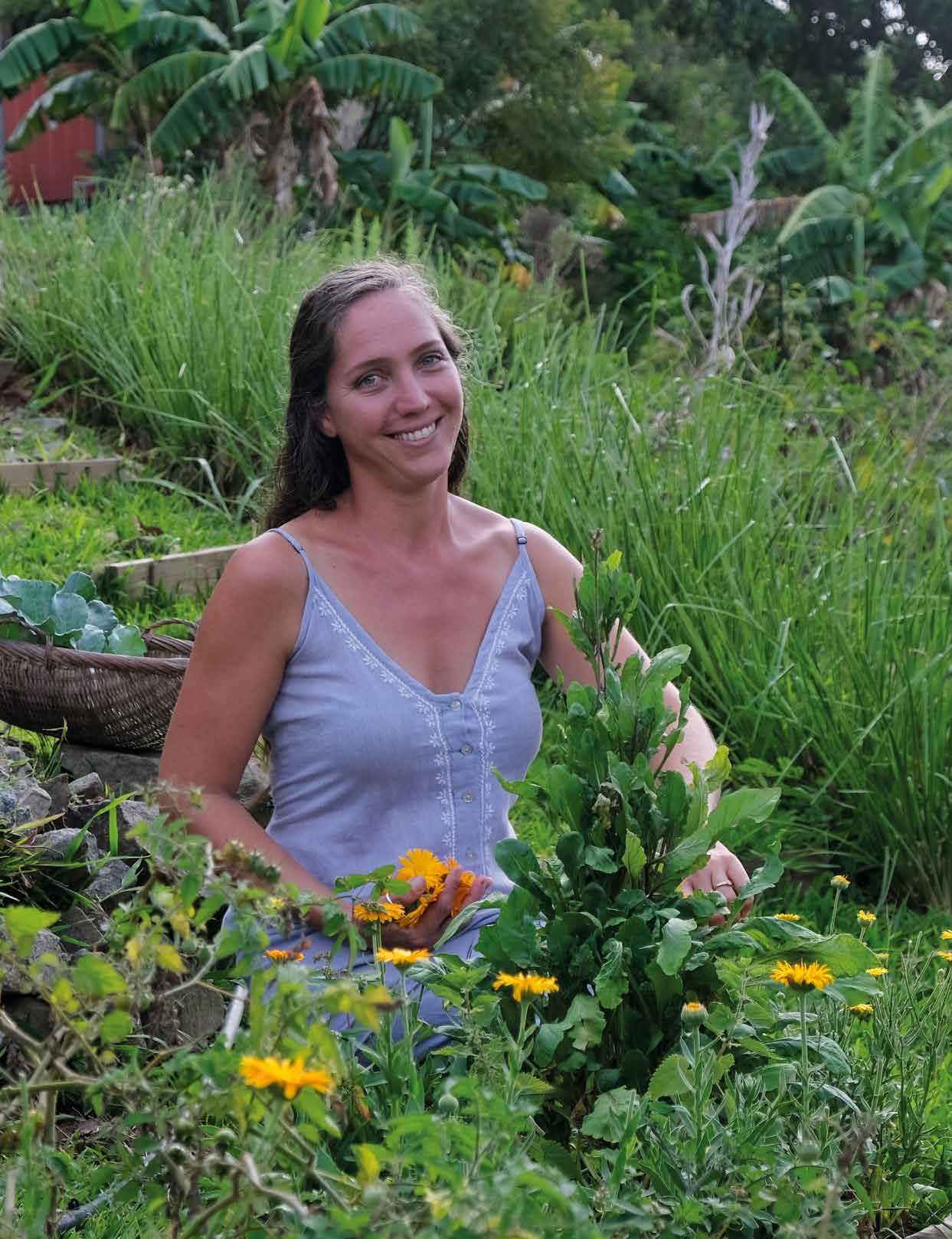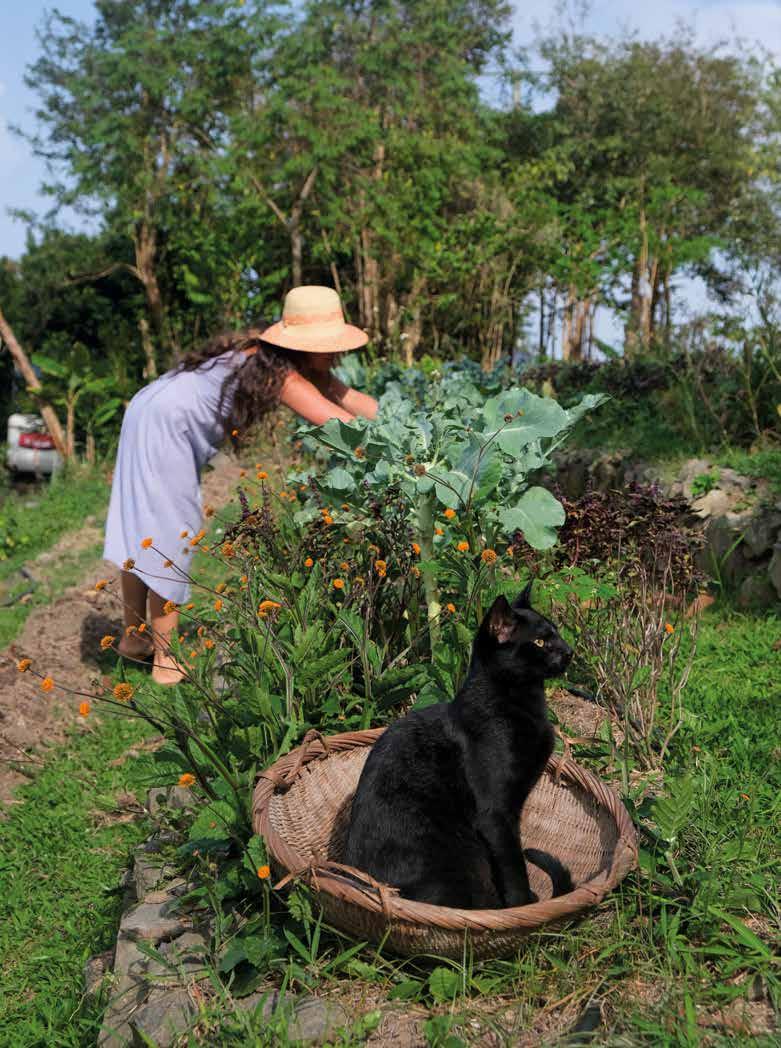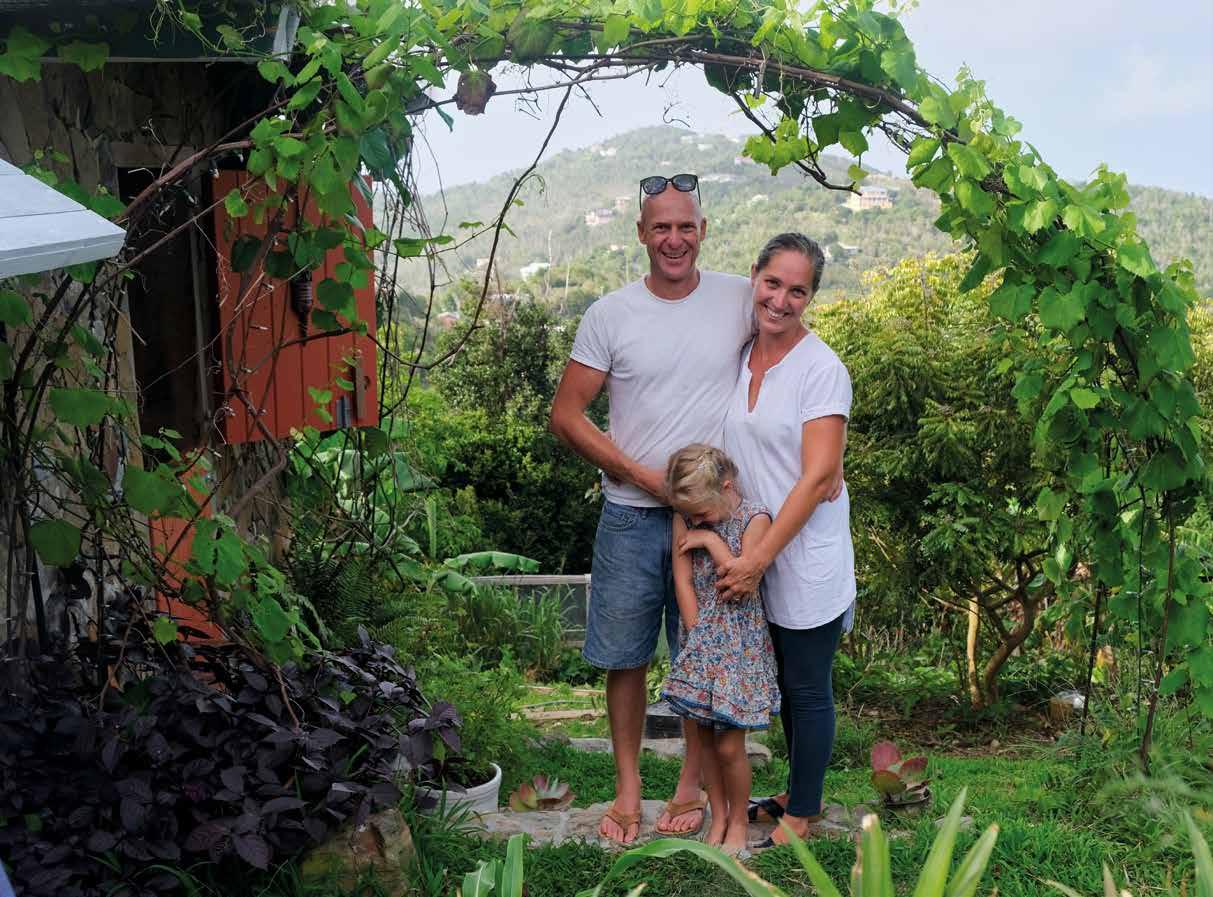
6 minute read
YOUNG AGRIPRENEUR NEA TALBOT
RETURNING TO OUR ROOTS
In the third part of VIPY’s series on young entrepreneurs, a day with Nea Talbot from Full Belly Farm shows what it means to be an “agripreneur.”
Advertisement
BY ANIKA M. CHRISTOPHER PHOTOGRAPHY BY ELKE TALBOT
TODAY, FARMERS produce enough food to feed every single person on this planet, yet millions of people worldwide continue to go hungry. The British Virgin Islands faces its own threat to food security due to its increasing population and small land area. The ongoing climate crisis and Covid-19 outbreaks have made the challenge more acute.
“Small farmers feed the world. The Virgin Islands is ideally situated to support many small farmers practising regenerative agriculture,” said Nea Talbot, owner and lead farmer of
Nea Talbot from Full Belly Farm’s love of nature stems from treasured childhood memories of playing in her family’s garden.

Full Belly Farm. “These farmers, with appropriate infrastructure and support, can supply much of what is consumed throughout our territory.”
Indeed, the way food is being produced globally has become unhealthy and unsustainable, she said, adding that for true food security, it’s important to support local farmers who work tirelessly to supply consumers with fresh ingredients. Pick up your shovels and grab your pickaxes and join VIPY for a tour of Full Belly Farm.
ON THE FARM Full Belly Farm is blessed by both good weather and glorious views of Sage Mountain. There, Nea works intimately with the land, and each item harvested is the result of a long labour of love.
On the farm, she said, you’ll find two separate growing zones; the garden and the forest. The garden is for tender annuals such as lettuce and tomatoes and culinary herbs like basil, parsley, and cilantro, next to ashwagandha, calendula, and nettle. Here grow elderberry shrubs, and shade beds of mint and heirloom tomatoes keeping the arugula cool. The food forest, meanwhile, is the perennial growing zone, with layers of growth of tubers, shrubs, and trees offering medicine or food. In the forest are mangoes, avocados, and citrus, as well as more uncommon fruits like loquat, chocolate sapote, and jabuticaba, growing between flowering shrubs and climbing christophene, an edible gourd.
“We focus on niche produce and unique varieties that you can’t find anywhere else in the BVI, so you know your dishes are really going to stand out,” Nea added. On Full Belly Farm, everything from herbs to vegetables to fruits all grow from humble beginnings.
Mighty oaks from little acorns grow, as they say, and the story of how Nea’s vision for the sustainable future of food became a reality is just as flavourful as her produce.

HOW IT ALL HAPPENED Since Nea was old enough, she has always loved nature. She has treasured childhood memories of playing in her family’s garden, and at the time, she wasn’t aware that those early days were the seeds that would later blossom into a successful farm and her lifelong dedication to all things agriculture. Eventually, she decided to pursue higher education to realise her dream.
“I wanted to share what is possible in terms of healing our land and our bodies while creating a viable business that contributes to a better food system,” she said.
THIS PAGE The farm is located at Sage Mountain, Tortola and has two separate growing zones.
OPPOSITE A sweet family.

In 2011, she earned a bachelor’s degree in agroecology and sustainable agriculture from Appalachian State University in North Carolina, and went on to pursue a master’s degree in education. She is also a certified permaculture designer. After pursuing her education, she decided it was time to return home to the BVI and seek land.
“In 2017, we committed to this beautiful piece of land on the mountain to be able to offer more produce more consistently and to pursue our dream of creating an off-grid, organic farmstead,” she said. Between work on the farm, she is pursuing becoming a certified clinical herbalist.
Full Belly Farm was officially founded in January 2017, the same year the territory was devastated by two Category Five hurricanes. Nevertheless, that didn’t stop the farm from persevering. In fact, Nea often jokes about how Hurricane Irma did much of the bush clearing for them.
“Ideally, a well-run farm is able to rebound quickly after any natural disaster,” she said. “That is what makes a farm resilient and shows that you are farming in alignment with the principles of nature.” Today, Full Belly Farm is a dream realised, delivering diverse crops and delicious ways to enjoy healthy foods.
FARM PRACTICES Over the years, Full Belly Farm has continued to develop its science and practice.
“We absolutely use sustainable practices, which is even a term that is losing steam now in favour of ‘regenerative,’” Nea said.
Sustainability means maintaining a steady level: a “stasis.” Starting from such a depleted environmental state, it’s important to examine how to improve and rebuild a healthy and functional environment, she explained.
The farm is wholeheartedly committed to this, using organic products, but with caution. “Certain organic sprays can still be harmful to insects and beneficial soil organisms like mycelium and microbes,” she said. As a result, the farm only uses homemade sprays and other items like compost emulsions and fermented plant
amendments, which encourage growth and germination. It focuses heavily on producing compost and biochar — a kind of organic carbon-rich charcoal — for the soil, and using what is already available in the region, like manure, banana stems, and seaweed. The core of the farm’s practice is remaining in tune with nature and understanding the cycles and seasons necessary for healthy plants. MANY PLANTS, ONE MISSION With a commitment to fostering sustainability on every level, Nea works with everyone from consumers to chefs to bring healthy and delicious produce to their plates.
“Shifting our approach to what we place on our tables is crucial for food security,” she said, explaining why it is so important for farmers to connect with consumers and reinvigorate their understanding and appreciation for local produce. For the past 10 years, she has taught the principles of food security to everyone from toddlers to adults, and encourages them to return to their ancestral foodways when preparing meals.
“Mentorship and community is crucial in any endeavour, but I would say especially so in agripreneurship,” she said.

THE BOTTOM LINE Nea left a word of advice for all aspiring agripreneurs.
“Love what you do, deeply. ‘Agripreneurship’ is not just being a farmer. You have to be a scientist, a financial manager, and a marketing expert, and you need to do it all with really dirty hands and questionable attire. Agriculture gives you the opportunity to enjoy a bit of every profession. You can be an introvert or an extrovert. It is a field that you can tailor to your skills, schedule, and goals. Just remember that you are creating something that is bigger than yourself, longer lasting than your lifetime, and has influence far beyond what you can see. You just have to jump in, create and commit.” ■

Mango Passion Jam and Irie Bush Tea are just two of the beautiful Full Belly Farm product range.
EASIEST BEACH PICNIC EVER
Summer’s here, so get together with friends and family and hit the beach with this simple and delicious seaside feast.
LINES+ANGLES/ARE MEDIA

THIS SPREAD Crunchy southern fried chicken, complemented by a salad of watercress, avocado and snow peas is the perfect match for the prawn and tarragon baguette, poached fruit and a chilled lychee vodka cocktail. See the following pages for all the recipes.








